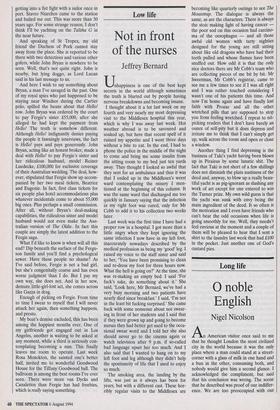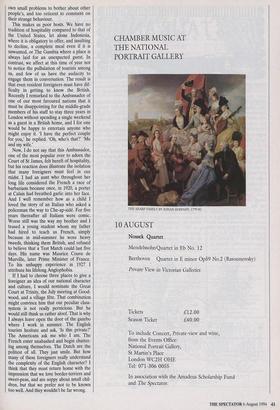Long life
o noble English
Nigel Nicolson
An American visitor once said to me that he thought London the most civilized city in the world because it was the only place where a man could stand at a street- corner with a glass of milk in one hand and a bun in the other, consuming both, and nobody would give him a second glance. I acknowledged the compliment, but said that his conclusion was wrong. The scene that he described was proof of our indiffer- ence. We are too preoccupied with our own small problems to bother about other people's, and too reticent to comment on their strange behaviour.
This makes us poor hosts. We have no tradition of hospitality compared to that of the United States, let alone Indonesia, where it is obligatory to offer, and insulting to decline, a complete meal even if it is unwanted, or The Gambia where a place is always laid for an unexpected guest. In contrast, we affect at this time of year not to notice the pullulation of tourists among us, and few of us have the audacity to engage them in conversation. The result is that even resident foreigners must have dif- ficulty in getting to know the British. Recently I remarked to the Ambassador of one of our most favoured nations that it must be disappointing for the middle-grade members of his staff to stay three years in London without spending a single weekend as a guest in a British home, and I for one would be happy to entertain anyone who might enjoy it. 'I have the perfect couple for you,' he replied. 'Oh, who's that?' Me and my wife.'
Now, I do not say that this Ambassador, one of the most popular ever to adorn the Court of St James, felt bereft of hospitality, but his reaction does illustrate the isolation that many foreigners must feel in our midst. I had an aunt who throughout her long life considered the French a race of barbarians because once, in 1920, a porter at Calais had breathed garlic into her face. And I well remember how as a child I loved the story of an Italian who asked a policeman the way to Che-ap-side. For five years thereafter all Italians were comic. Worse still was the way my brother and I teased a young student whom my father had hired to teach us French, simply because in mid-summer he wore heavy tweeds, thinking them British, and refused to believe that a Test Match could last five days. His name was Maurice Couve de Murville, later Prime Minister of France. To his unhappy experience in 1927 I attribute his lifelong Anglophobia.
If I had to choose three places to give a foreigner an idea of our national character and culture, I would nominate the Great Court at Trinity, the July meeting at Good- wood, and a village fete. That combination might convince him that our peculiar class- system is not really pernicious. But he would still think us rather aloof. That is why I always leave open the door of the gazebo where I work in summer. The English tourists hesitate and ask, 'Is this private?' The Americans ask me who I am. The French enter unabashed and begin chatter- ing among themselves. The Dutch are the politest of all. They just smile. But how many of these foreigners really understand the complexity of the English character? I think that they must return home with the impression that we love border-terriers and sweet-peas, and are soppy about small chil- dren, but that we prefer not to be known too well. And they wouldn't be far wrong.



















































 Previous page
Previous page